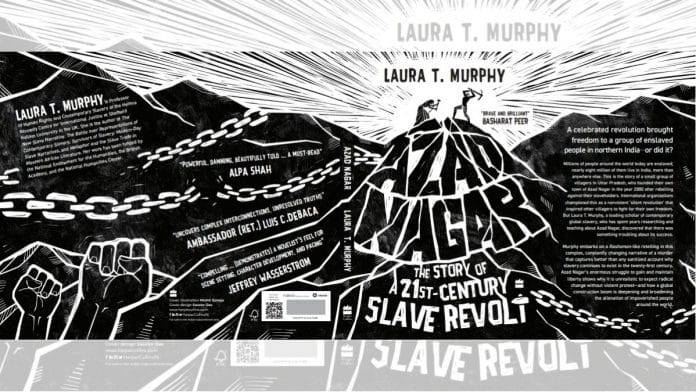New Delhi: ‘The Story of a 21st-Century Slave Revolt‘, a book by Laura T. Murphy, tells the story of a small group of ‘enslaved’ villagers in Uttar Pradesh, who founded their own town of Azad Nagar after staging a rebellion against their ‘slaveholders’.
Published by HarperCollins India, the book will be released on 23 April on Softcover, ThePrint’s online venue to launch non-fiction books.
Murphy embarks on a Rashomon-like retelling – a complex, constantly-changing narrative of a murder that captures better than any sanitised account just why it is that slavery continues to exist in the 21st century. Azad Nagar’s enormous struggle to gain and maintain liberty shows why it is unrealistic to expect radical change without violent protest – and how a global construction boom is deepening and broadening the alienation of impoverished people around the world.
“I wrote Azad Nagar because the stories we typically hear about forced labor and the fight for freedom are reduced to the bits that are most exciting for fundraisers. But the violence that the people of Azad Nagar endured and the violence they committed in response reveal a more complex reality about the everyday struggle for rights, and that story deserved to be heard around the world. When I decided to publish this book, my first condition was that the book had to have an Indian edition. I am so glad to be able to share this work with the people who have done so much to fight for their own rights and the rights of others,” the author writes.
International organizations championed this as a nonviolent ‘silent revolution’ that inspired other villagers to fight for their own freedom. But the author found that whispers and deflections suggested there was something troubling about Azad Nagar’s success.
“A brave and brilliant report on the tyranny of the caste system and continuing feudal practices in India’s villages. Azad Nagar rips apart the cliche of India being the largest democracy in the world and shows us how millions of Indians are deprived of their basic constitutional freedoms and rights,” wrote Basharat Peer, contributing writer for the New York Times.
“A powerful, damning account of economic growth, beautifully told through the tragic story of the fight for freedom from slavery of tribals in India. A must-read for anyone wanting to understand modern slavery, the fragility of ideas of freedom, the place of violence in bringing about progressive change, and modern India,” wrote Alpa Shah, Professor of Anthropology, London School of Economics.
Laura T. Murphy is Professor of Human Rights and Contemporary Slavery at the Helena
Kennedy Centre for International Justice at Sheffield Hallam University in the UK. She is
the author of ‘The New Slave Narrative: The Battle Over Representations of
Contemporary Slavery, Survivors of Slavery: Modern-Day Slave Narratives’, and
‘Metaphor and the Slave Trade in Western African Literature’. Her work has been funded
by the National Endowment for the Humanities, the British Academy, and the National
Humanities Center.
Also read: New book looks at India’s role in Bangladesh Liberation War & its ‘little-known aspect’






